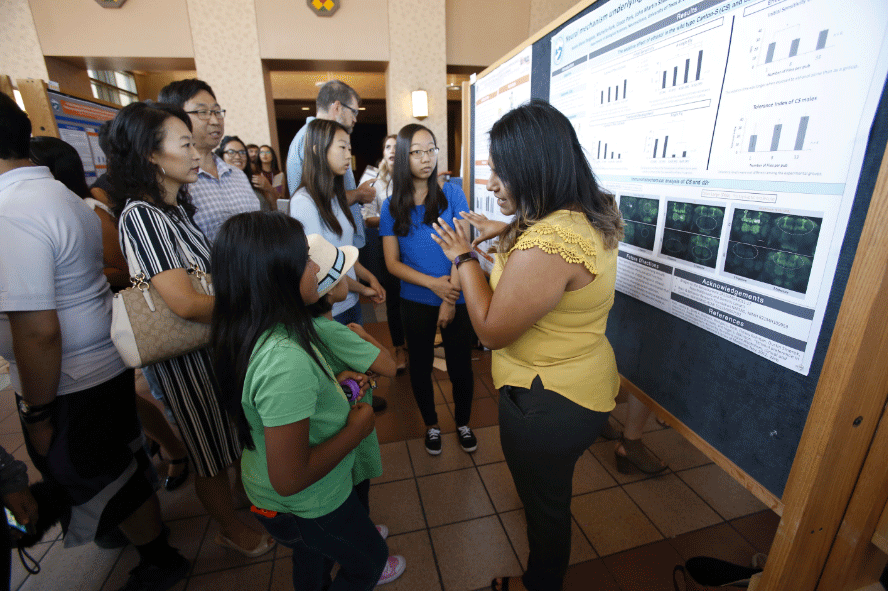Summer Research Symposium Showcases Talent
Last Updated on August 17, 2017 at 12:00 AM
Originally published August 17, 2017
By Lauren Macias-Cervantes
UTEP Communications
There’s no question that college students experience a level of transformation as they advance through their university years, but adding research into the mix can further chart their course toward a career.

“I always thought I was going to grad school for [chemistry], but after coming [to UTEP], I’ve changed my mind, kind of taking a new direction of where I want to go,” said Jason Small, a senior at Trine University in Angola, Indiana who spent the summer doing research at UTEP.
The chemistry and biology major was one of 140 students who presented their research at the 2017 Campus Office of Undergraduate Research Initiatives (COURI) Summer Symposium on Aug. 5.
“At first I was thinking of just getting a traditional Ph.D. in chemistry and working in a lab, but now, knowing I can do research as a professor, I am going to get my Ph.D. in biochemistry and continue on a neuroscience path and hopefully be a professor,” Small said.
Small came to UTEP as part of the Summer Mentoring and Research Training: Methods In Neuroscience of Drug-abuse (SMART MIND) program and was one of 32 visiting students from 14 universities around the world. With Sukla Roychowdhury, Ph.D., research associate professor of biological sciences, as his mentor, he studied how alcohol and nicotine affect the addiction pathways and the shape of brain cells, and how by using them together, nicotine affects alcohol addiction and exchanges in brain cells.
“I love being able to share the work I did this summer,” said Alexis Cohen from Smith College in Northampton, Massachusetts. “It also gives you the opportunity to learn as a scientist and be able to communicate your research with other people. I think that’s really important moving forward working in a science or medical career. You have to be able to communicate your findings and what you’re working on with other people in order to share your knowledge and progress as a society.”
Cohen was also part of the SMART MIND program and was paired with Kristin Gosselink, Ph.D. Together they looked at stress and its effect on the brain; specifically, how stress affects your vulnerability to drug addiction. They identified protein markers and concluded that stress does make a difference, especially in adolescents.
“I absolutely loved UTEP, I’m really sad about leaving,” Cohen said. “Everyone here is so nice and great, and my lab was so helpful; everyone was so patient with me. It was really the first time I had worked in a research lab, so I didn’t exactly know what I was doing when I came in; but my postdoc and my PI were super helpful, and I was so grateful for the opportunity.”
Lourdes Echegoyen, Ph.D., COURI director, says it has always been a goal of her office to bring students from other places in the U.S. and from other cultures for a beneficial exchange and experience. She says the stories from the visiting students and others exemplify the goals of the various programs and the symposium.
“Undergraduate research is one of the most valuable educational practices,” Echegoyen said. “It has a high impact on learning, on retention in students’ majors, and on acceptance to graduate school.”
Echegoyen started the symposium in April 2011 with 40 students from the College of Science. The biannual exhibition has now multiplied to 140 students from across the campus.
Jade Williams is a senior at UTEP and was one of the presenters representing the College of Liberal Arts.
“I think that every field needs research because every field is a constant flow of learning, and there’s always a learning curve, especially for the arts and humanities,” Williams said. “We are not so much tackling diseases or cures or manipulating molecules, but we’re tackling social issues. They may be much more abstract, but research is always going to be necessary in those fields to continue to grow and to continue to progress.”
The English literature major researched African-American coming of age narratives and representation of race in African-American museums around the country. Her mentor was Marion Rohrleitner, Ph.D.
“I think this research is really important and it’s going to make a difference because it’s pointing out the severe lack of public space and immortalization for African-American communities, and how that can affect construction of race and racial identity for youth of color,” Williams said.
While the symposium provides invaluable opportunities for students, family and community members receive a firsthand look at what students are studying.
“When you family members see what their undergraduate student is capable of doing, they get a better glimpse of the future of that student,” Echegoyen said. “Many times they see their son or daughter leave home in the morning with their books under their arms, come back home in the evening for dinner. They know that the student gets into their bedroom and does homework, but they don’t know what happens – where everything is leading. Perhaps the student comes home and says ‘I’ve been accepted into a research program,’ but the parents don’t understand what that means until coming here and seeing the final product.”
2017 COURI Summer Symposium Award Winners:
Arts, Humanities and Social Sciences
Best presentation: David Esparza. Mentor: Jeffrey Olimpo, Ph.D.
Honorable Mention: Heber J. Lara. Mentor: Jessica Shenberger-Trujillo, Ph.D.
Computational, Engineering and Applied Sciences
Best presentation: Jerry Duran. Mentors: Ming-Ying Leung, Ph.D.
Honorable Mention: Jordan A. Orozco. Mentor: Jamie Desjardins, Ph.D.
Life Sciences
Best presentation: Grace G. Hendricks. Mentor: Laura O’Dell, Ph. D.
Honorable Mention: Zayra N. Dorado. Mentor: XiuJun Li, Ph.D.
Physical Sciences
Best Presentation: Miguel A. Baeza Cinco. Mentor: Skye Fortier, Ph.D.
Honorable Mention: Jose A. Rosales. Mentors: Mahesh Narayan, Ph.D., and Christelle Hureau, Ph.D.